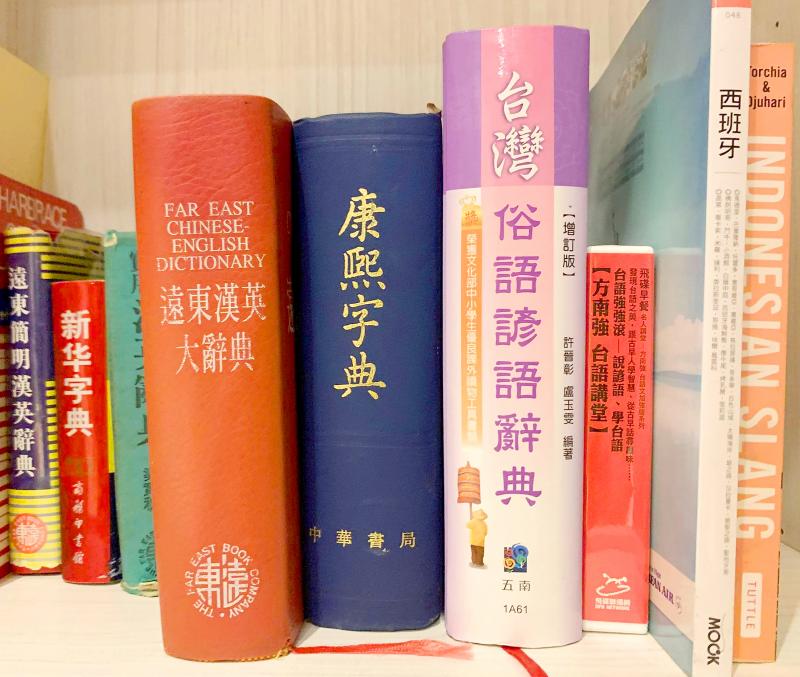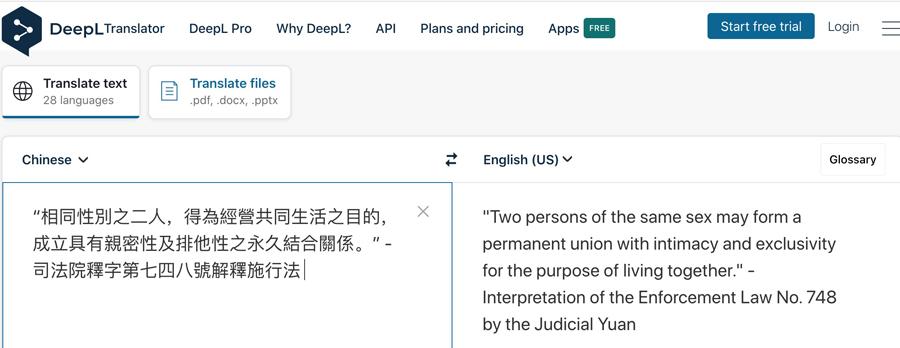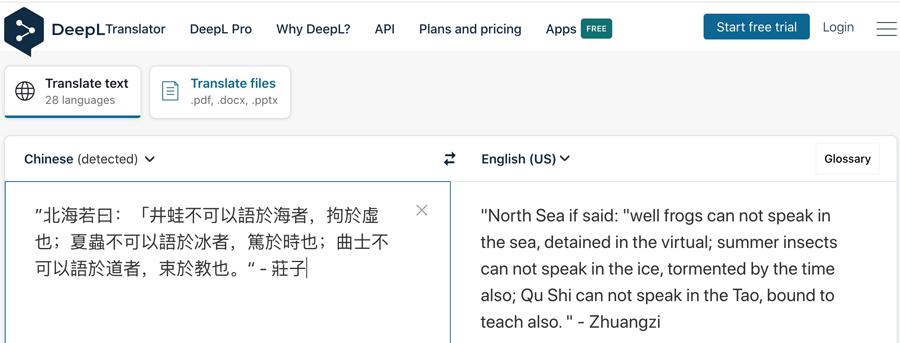Chris Findler says that the introduction of neural machine translation software has reduced the demand for human translators.
“I am pessimistic about the future of traditional translation jobs,” says Findler, a lecturer of translation and interpretation at National Taiwan Normal University (NTNU).
Online translators such as DeepL Translator, Yandex and Babylon offer accurate translations in dozens of languages, which means that a human translator may no longer be necessary for some jobs.

Photo: Wesley Lewis
Machine translation software’s growing influence is irreversible. Translation software can utilize artificial neural networks and large databases in order to accurately predict sequences of words and provide nuanced expressions in their results. AI’s presence in the field cannot be ignored, and translators in a variety of specialties will need to adapt to new job descriptions.
“With artificial intelligence taking over, some translation jobs will be more like editor jobs” Findler says.
Translation AI could be seen as a threat to jobs, but it has also created a new post-machine editing role. Findler says that there is a large demand for translators to edit and add a “human touch” to texts that have already been machine translated.

Photo: Wesley Lewis
Interpreters, and those in technical or media translation are more likely to be threatened or impacted by AI. Findler says that interpreters may eventually disappear due to AI’s ability to recognize speech and instantly process it to text. He adds that museum and literary translation are less threatened.
In Findler’s experience, museums in Taiwan still want to hire translators, but businesses are keener to opt for the more cost-effective option of using an online translation service. Furthermore, technical translators tend to deal with texts with repetitive language, which can more easily be machine translated.
Perry Svensson, the former head of translation at Taipei Times, says approximately 40 to 50 percent of his freelance Chinese-to-English and English-to-Swedish work is post-machine editing. He fixes the errors the machine translator might have made.

Photo: Wesley Lewis
He adds that most of his translation jobs five years ago were not already machine translated and required him to translate from scratch.
Svensson often uses DeepL Translator for articles and he makes minor changes to the translated text afterwards. Machine translators prove to be helpful when he is faced with multiple projects and deadlines.
Although they are useful, free machine translation services have decreased the amount of freelance translation jobs. Svensson translates for newspapers, logistics companies, as well as business ethics codes and product manuals. His advice for translators is to have multiple specialties in case AI renders human translators obsolete in a specific field.

Photo: Wesley Lewis
“If you are into photography, then your knowledge of that field will make for better translations,” Svensson says.
Ines Tsai (蔡淑瑛) works in television and translates for tourism programs, among others. She says that the technology for auto-generated subtitles exists, but it has not yet replaced human translators.
In her work she also comes across jobs where she is tasked to edit machine translated subtitles. She says that much of her work is to capture colloquial speech, jokes, idioms and other aspects of language that are still difficult for a machine to register and translate correctly.
For the moment, literary translators remain the least affected by machine translation software.
“Literary translation is a creative task that requires deep knowledge about multiple languages, cultures and literary traditions,” says Ji Lianbi (計連碧), a literary translation graduate student at Boston University.
Ji says that software can understand the basic meaning of a sentence but a word-for-word translation is often inauthentic and less expressive in the target language.
Anna Zelinska-Elliot, the director of literary translation at Boston University, says universities should be obligated to prepare translation students for a more technology-oriented profession. She adds that non-literary translation classes should address the impacts that machine translation is having in their field.
Although literary translation is not as impacted by AI, Zelinska-Elliot says that universities should familiarize the students with various online dictionaries, but not necessarily online translators.
As a university lecturer, Findler is afraid that students will be discouraged to study translation due to improving AI. He thinks that universities should merge interpretation and translation programs to produce well-rounded students as well as inform the students of the evolving job market.
Although AI has yet to completely replace human translators, there is no way to avoid its encroachment on their jobs.
For Findler, the future of the translation field is set in stone, adding that many traditional translation jobs, “are going to go the way of the horse and buggy.”

Towering high above Taiwan’s capital city at 508 meters, Taipei 101 dominates the skyline. The earthquake-proof skyscraper of steel and glass has captured the imagination of professional rock climber Alex Honnold for more than a decade. Tomorrow morning, he will climb it in his signature free solo style — without ropes or protective equipment. And Netflix will broadcast it — live. The event’s announcement has drawn both excitement and trepidation, as well as some concerns over the ethical implications of attempting such a high-risk endeavor on live broadcast. Many have questioned Honnold’s desire to continues his free-solo climbs now that he’s a

As Taiwan’s second most populous city, Taichung looms large in the electoral map. Taiwanese political commentators describe it — along with neighboring Changhua County — as Taiwan’s “swing states” (搖擺州), which is a curious direct borrowing from American election terminology. In the early post-Martial Law era, Taichung was referred to as a “desert of democracy” because while the Democratic Progressive Party (DPP) was winning elections in the north and south, Taichung remained staunchly loyal to the Chinese Nationalist Party (KMT). That changed over time, but in both Changhua and Taichung, the DPP still suffers from a “one-term curse,” with the

Jan. 26 to Feb. 1 Nearly 90 years after it was last recorded, the Basay language was taught in a classroom for the first time in September last year. Over the following three months, students learned its sounds along with the customs and folktales of the Ketagalan people, who once spoke it across northern Taiwan. Although each Ketagalan settlement had its own language, Basay functioned as a common trade language. By the late 19th century, it had largely fallen out of daily use as speakers shifted to Hoklo (commonly known as Taiwanese), surviving only in fragments remembered by the elderly. In

Lines between cop and criminal get murky in Joe Carnahan’s The Rip, a crime thriller set across one foggy Miami night, starring Matt Damon and Ben Affleck. Damon and Affleck, of course, are so closely associated with Boston — most recently they produced the 2024 heist movie The Instigators there — that a detour to South Florida puts them, a little awkwardly, in an entirely different movie landscape. This is Miami Vice territory or Elmore Leonard Land, not Southie or The Town. In The Rip, they play Miami narcotics officers who come upon a cartel stash house that Lt. Dane Dumars (Damon)